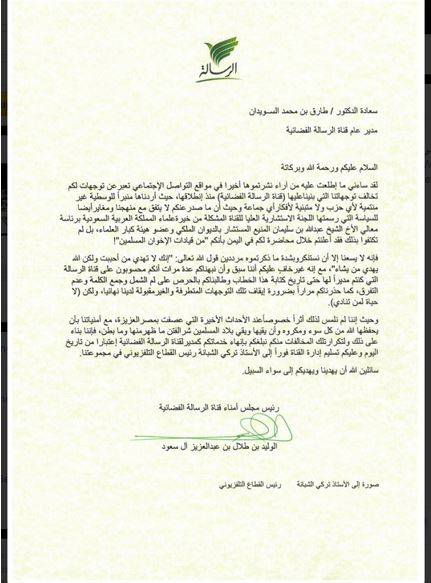 | |||||
|
Kuwaiti preacher Tareq Al-Suwaidan, who was until yesterday director of the Saudi Al-Risala TV, was fired from his position by his employer, channel owner Saudi Prince Alwaleed bin Talal. Prince Alwaleed announced via Twitter on August 18 that he had dismissed Al-Suwaidan for "admitting he belongs to the Brotherhood terrorist movement"; the tweet linked to the dismissal letter, which noted that Al-Suwaidan had been warned several times against publicly declaring his political affiliations[1] (see Appendix).
While it has long been known that Al-Suwaidan is affiliated with the Muslim Brotherhood (see MEMRI Inquiry and Analysis No. 846, Kuwaiti Muslim Brotherhood Leader And Director Of Saudi Al-Risala TV Tareq Al-Suwaidan Tours West, Promoting Restoration Of Caliphate And New Era Of Cyber Jihad, June 14, 2012), in recent statements Al-Suwaidan declared openly that he is a Muslim Brotherhood leader.
Al-Suwaidan has been highly critical of Egypt's military government that ousted president and Muslim Brotherhood leader Muhammad Mursi, while Saudi King Abdullah strongly backs the new regime in Egypt.[2]
The following statements by Al-Suwaidan, which were part of the reason for his firing, were posted on the Internet on May 3, 2013.
"I Am One Of The Leaders Of The Muslim Brotherhood"
Tareq Al-Suwaidan: "I am one of the leaders of the Muslim Brotherhood. There is a basic principle, even within the Muslim Brotherhood: Organization is one thing, and ideology is another. If we intellectuals allow the organization to dominate our ideology, we will become followers, rather than leaders.
"Ideology is one thing, and organization is another. Opinion is one thing, and organization is another. These are three different things: ideology, opinion, and organization.
"Some people do not distinguish between these three notions. Opinion relates to issues of personal judgment: Should we participate in the elections, or not? In such issues, there is room for give and take, for dialogue.
"But if we, as a group, agree on something, whether by majority of votes, or by consensus – unless we all abide by that opinion, we are done for. No group can exist without obedience. There is with regard to issues of opinion.
"Therefore, since I am one of the leaders of the Muslim Brotherhood, if I agree with my brothers and sisters on a certain opinion, everybody abides by it. Otherwise, we would not exist as a group. We would be powerless, worthless.
"But opinion and ideology are two different things. For example, having conducted thorough religious research, and having examined the Islamic nation and its history objectively, I have become convinced that women have the right to vote, to run for office, and to become head of state. I'm convinced of that." […]
"I Have No Intention Of Becoming A Political Leader, The Head Of A Political Party, Or Head Of State"
"When a peaceful revolution began in Bahrain… I support the freedom and rights of people, whoever they may be. When Allah commanded jihad upon the believers, His goal was not only for His word to reign supreme. This was not the only reason for commanding Jihad. 'Why are you fighting not for the sake of Allah and the oppressed…?' If a Jew faces oppression, we must support him.
"When the [Shiites] revolted in Bahrain, demanding their rights, I supported them. I did not hesitate for one moment. I supported them, even though I knew that I would pay a price for this stance. I still do. I am a man of principles and ideology.
"I have no intention of becoming a political leader, the head of a political party, or head of state. People with such goals should take them into consideration, but as intellectuals, we should not. We should be ruled by our principles.
"When they revolted, I said: If the [Shiites] are the majority, they have the right to rule. Am I right, or not? Of course, there is a dispute on whether they are the majority or not, but if they are the majority, they have the right to rule. Otherwise, Bashar and the [Alawite] minority would have the right to rule Syria.
"When it became a sectarian issue, and it is clearly a sectarian matter in Bahrain, where the people are split… I have never supported sectarianism. I reject sectarianism. I said that they have the right to achieve their demands, but they must achieve them through dialogue and peaceful means, just like you [in Yemen]." […]
Appendix: Prince Alwaleed bin Talal's Tweet And Dismissal Letter[3]  | |






















